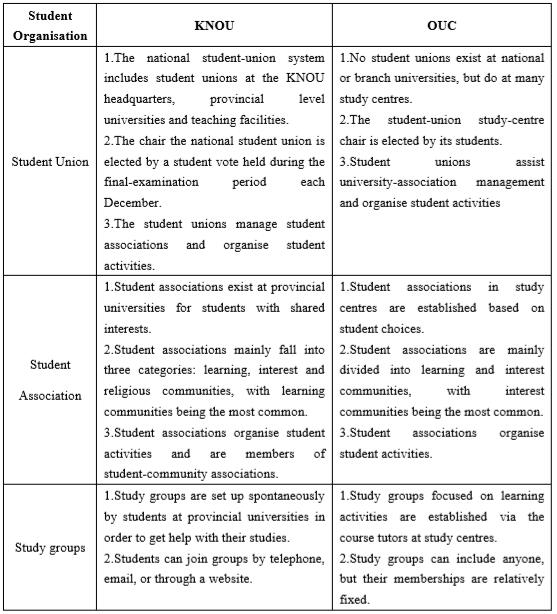IV. Student Mutual Aid
KNOU maintains that most of the difficulties students face are ones they can help each other with, and because of this it has given older students responsibility for helping younger ones. This has become one of the most outstanding characteristics of the university’s learner support.
The older students help the newer ones get accustomed to the environment and educational approaches of the university. Those who have completed two years of studies, or graduated from the university, are qualified to become student tutors, and only students who have been at the school for less than one year, as well as transfer students, can be paired with them. Usually each student tutor has about 10 students to mentor, dealing with any questions they may have about courses and campus life. Provincial universities and study centres also give face-to-face tutorials, and organise student activities (Kinee, 2011). A student tutor meeting certain conditions can get two volunteer credits and related certification.
Such guidance enhances the quality of support services, and is popular with all the students involved. Investigations have shown that the service enhances the interpersonal skills of student mentors, enables new students to quickly adapt to university life, improves performance, and builds friendships. Above all, it has significantly reduced the dropout and suspension-of-studies rates of new students (Kinee, 2011).
No such service is offered at the OUC, and there is less interaction among students of different years. On the other hand, each study centre offers channels for student in the same class to help each other. For instance, the head teachers of the study centres set up QQ or WeChat groups to facilitate this, and course tutors organise group-study activities during face-to-face tutorials or after class, or arrange online group discussions via BBS.
V. Student Organisations and Activities
Both KNOU and the OUC have a variety of student organisations to organise both curricular and extra-curricular activities, and to create a positive, friendly and harmonious campus atmosphere by relying on the autonomy and self-management capabilities of their students.
1. Student organisations
The student organisations at both universities include student unions, student associations and study groups (KNOU, 2017). Details about the three categories of students organisation are given in the following table.
Table 5. Student Organisations at KNOU and the OUC

As Table 5 shows, both universities have established three categories of student organisation, each with roughly the same objectives. However, there are still differences. First, KNOU has established a student-union system that covers the headquarters, provincial universities and teaching facilities, while the OUC student unions mainly exist in local study centres; second, learning communities account for the largest proportion of student associations at KNOU, while interest communities do so at the OUC, which has no religious communities; and third, study groups at KNOU are organised by students, who are free to join them, while those at the OUC are organised by tutors and have relatively fixed memberships.
2. Student activities
Both universities encourage and support diverse curricular and extra-curricular activities to promote student interaction and their all-round development. What’s more, both offer online and offline activities, with the provincial universities and study centres organising more offline activities and the headquarters more online ones, and both support student activities by providing venues, guidance, funding, and computer technology.
There are also differences in the student activities that take place at the two universities. First, the organisers are different. Most of the student activities at KNOU are organised by the student unions or associations; some are launched by administrative departments, but organised by student unions. Meanwhile, activities at OUC headquarters and branches are usually carried out by administrative departments, while activities organised by study centres are carried out with the help of student unions. Second, KNOU encourages students to participate in social activities and services by giving them up to two credits per semester for doing so. At the OUC, academic-prize-winning students are given credit for academic activities, but not for volunteering. Third, KNOU headquarters provides funds to outstanding community activities, while funding comes mainly from study centres at the OUC, and only rarely from the headquarters and branches.